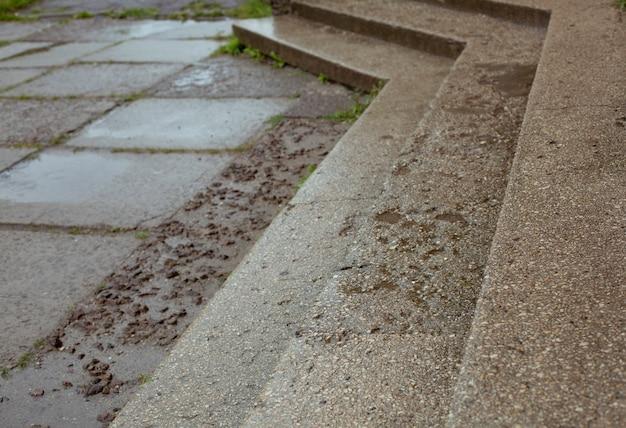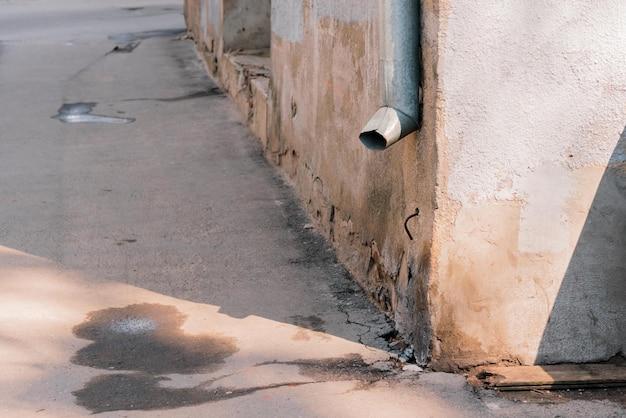The weather can often be unpredictable, and it’s not uncommon for rain to catch us off guard. If you’ve recently poured concrete, you may be wondering how rain can affect the curing process. How long should you wait before it’s safe from rainfall? Will it cause any damage? In this blog post, we’ll explore these questions and more to give you a better understanding of what happens when rain meets freshly poured concrete.
Concrete is a versatile and durable material, but it requires proper curing to achieve its full strength. During the curing process, the water in the concrete mix reacts with cement to create a solid structure. However, if rainwater comes into contact with the fresh concrete too soon, it can disrupt this process and weaken the final result. So, the question remains: can it rain on concrete after 12 hours? Let’s find out.
Can It Rain On Concrete After 12 Hours
So, you’ve just poured a fresh concrete driveway or patio, and now you’re anxiously staring at the cloudy sky, wondering if rain is going to ruin all your hard work. Can it rain on concrete after 12 hours? Let’s find out!
Does Time Matter
When it comes to rain and freshly poured concrete, timing plays a crucial role. In the first 24 hours, concrete goes through a process called curing, which involves a chemical reaction that helps it harden and gain strength. During this time, the concrete is still vulnerable to outside elements, including rain. So, it’s essential to keep an eye on the weather forecast if you don’t want Mother Nature to rain on your concrete parade.
The Dreaded 12-Hour Mark
Now, let’s address the big question—what happens if it rains on your concrete after the critical 12-hour mark? Well, the truth is, it depends. Factors such as the concrete mix, temperature, humidity, and rainfall intensity all come into play.
The Perfect Concrete Cocktail
A concrete mix typically includes cement, sand, gravel, and water. The proportions of these ingredients determine the strength and durability of the final product. If the mix is spot on, your concrete will have a better chance of withstanding rain after the crucial 12-hour window. However, if the mix is not well-balanced, rain could weaken the surface and cause problems down the road.
Temperature and Humidity: The Culprits
Temperature and humidity also influence how rain affects concrete. If it’s too cold, the curing process slows down, and rain can prevent the concrete from drying properly. On the other hand, if it’s scorching hot, the excess heat can cause the water in the mix to evaporate too quickly, making the concrete susceptible to cracking. So, finding the Goldilocks zone of temperature and humidity is essential for a successful concrete pour.
The Rainfall Intensity Factor
Lastly, the intensity of the rainfall is a significant player in this concrete drama. A gentle drizzle might not cause significant damage, but a torrential downpour could spell disaster. Heavy rain can create puddles on the concrete surface, leading to uneven curing and potential surface weakening. So, if a monsoon-like rainstorm is in the forecast, it’s better to be safe than sorry and take precautions.
In conclusion, it is possible for rain to impact freshly poured concrete after the critical 12-hour mark. Factors such as the concrete mix, temperature, humidity, and rainfall intensity all contribute to the equation. To protect your concrete investment, keep a watchful eye on the weather forecast, and take appropriate measures to shield your concrete from rain if necessary. After all, prevention is better than having a concrete sob story in the future!
So, there you have it – the ins and outs of rain and concrete. Now you can confidently pour that concrete and face the fickle weather with both strength and a sprinkle of humor. Good luck, and may your concrete projects always be raindrop-free adventures!
FAQ: Can It Rain On Concrete After 12 Hours
Do I need to cover concrete if it rains?
Yes, it’s a good idea to cover concrete if rain is expected within the first 24 hours after pouring. Rain can negatively impact the curing process and affect the strength and durability of the final product. So, be prepared and don’t let unexpected precipitation rain on your concrete parade!
How long should concrete cure before removing forms?
Concrete usually needs at least 24 to 48 hours to cure before you can start removing the forms. But don’t get too hasty! It’s always best to follow the specific instructions provided by your contractor or concrete supplier to ensure the optimal curing time for the specific mix you’re working with.
What happens if it rains on concrete?
Well, rain on fresh concrete can spell trouble. It can weaken the surface and cause the formation of unsightly cracks and craters. Nobody wants a concrete skid mark on their construction project, right? So, protect your concrete from unexpected showers and let it cure in peace.
Can I drive on concrete after 3 days?
As tempting as it may be to take your shiny new car for a spin on that freshly poured concrete slab, it’s wise to exercise patience. Generally, you should avoid driving on newly poured concrete for about seven days to allow it to gain sufficient strength. So, hold onto your car keys and resist the urge to leave tire marks of regret!
Can you walk on concrete after 12 hours?
Walking on fresh concrete can be risky business and is generally not recommended until after 24 hours have passed. While the surface may visually appear solid, it’s still in the early stages of curing and can easily be marred or damaged. So, put on your concrete-walking shoes a bit later and give that gray goodness some extra time.
Does concrete take 100 years to cure?
While concrete does continue to increase in strength over time, it doesn’t take a century to reach its full potential. Most concrete structures will achieve their maximum strength and durability within the first 28 days. So, you don’t need to wait around for generations to enjoy the benefits of properly cured concrete.
Is concrete dry after 12 hours?
Concrete may feel dry to the touch after 12 hours, but it’s important to remember that drying is not the same as curing. Concrete needs adequate time to go through a chemical process called hydration, which strengthens the material. So, be patient, my friend, as it takes more than a few hours to reach its full potential.
Should you water fresh concrete?
Watering fresh concrete? Sounds like a recipe for disaster, doesn’t it? Well, you’re not entirely wrong! While it’s important to keep concrete moist during the curing process, excessive watering can actually weaken the surface. So, go easy on the water and let the concrete do its thing naturally.
How do you fix rained concrete?
If rain has rudely interrupted your concrete party and left you with a less-than-perfect surface, don’t panic just yet! You can often repair rain-damaged concrete by resurfacing or applying a new thin layer of concrete on top. Consult with a professional to assess the damage and determine the best course of action. Remember, where there’s a will, there’s a way to fix rained concrete!
How long does it take for water to damage the foundation?
Water can be a sneaky little troublemaker when it comes to foundations. A continuous presence of water can gradually damage a foundation over time. While it’s hard to pinpoint an exact timeframe, the longer water is in contact with a foundation, the greater the risk of damage. So, keep an eye on your foundation and address any potential water issues promptly. We don’t want your foundation crying a river!
What’s the difference between cement and concrete?
Ah, the age-old question! Cement and concrete often get mistaken for the same thing, but they’re actually different beasts. Concrete is a mixture of cement, sand, gravel, and water, while cement is an ingredient used in the production of concrete. Think of cement as the star of the show, and concrete as its talented supporting cast. One without the other just wouldn’t be the same!
Does concrete absorb water?
Concrete may appear hard and impenetrable, but it can actually be quite the thirsty material. It has a tendency to absorb water, which is why it’s important to properly seal and protect concrete surfaces, especially in wet environments. Don’t let your concrete drink more than its fair share!
How long after pouring concrete can it be wet?
After pouring concrete, it’s essential to keep it moist during the critical curing time. This typically involves watering the concrete surface or covering it with a damp cloth or plastic sheeting. The duration of moist curing can vary but is generally recommended for at least seven days. So, grab your sprinkler or raincoat and give that concrete some hydration love!
Is it bad if it rains on fresh concrete?
Freshly poured concrete exposed to rain can be a recipe for trouble. Rainwater can disrupt the curing process and weaken the surface, leading to potential cracks and imperfections. So, try to keep Mother Nature’s tears away from your fresh concrete for at least the first 24 hours. We want your concrete to stay drier than a desert!
How long does concrete need to dry before rain?
If you’re playing a game of concrete vs. rain, it’s best to let the concrete win! Before rain falls on freshly poured concrete, give it a grace period of at least 24 hours to allow for initial curing. Protect it with covers or shelters for added peace of mind. Remember, concrete and rain don’t always make the best dance partners!
What is the fastest way to cure concrete?
Concrete may not be the speediest superhero when it comes to curing, but there are a few tricks to help it along. One method is using accelerators, which can speed up the chemical reaction that strengthens the concrete. Additionally, maintaining a moist environment and controlling the temperature can also expedite the curing process. So, if you’re in a hurry to enjoy your concrete creation, these techniques might just save the day!
How long will concrete last?
Concrete has long been admired for its durability, and if you treat it right, it can stand the test of time. A well-made and properly maintained concrete structure can last for several decades, if not longer. So, pour your heart into that concrete project, and it could be a lasting legacy for future generations!
Can I pour concrete in a hole full of water?
Trying to pour concrete in a water-filled hole? Well, that’s like trying to swim with your shoes tied together – you’re bound to sink. Before pouring concrete, ensure that the hole is properly drained and free of excessive water. You want a solid foundation, not a soggy mess beneath your concrete masterpiece!
Should you cover concrete with plastic in cold weather?
Baby, it’s cold outside, but that doesn’t mean your concrete needs a cozy plastic blanket. While covering concrete with plastic can provide some insulation in cold weather, it’s important to note that excessive moisture trapped under the plastic can cause issues. It’s best to consult a professional to determine the best approach for protecting your concrete in chilly conditions. We don’t want your concrete catching a cold!
And there you have it, a delightful FAQ-style rundown of the various aspects of concrete and rain. Remember, it’s better to be safe than sorry when it comes to your concrete projects. Keep these questions in mind, and you’ll be giving rain the old “concrete shoulder” like a pro! Happy pouring!

